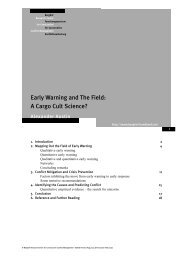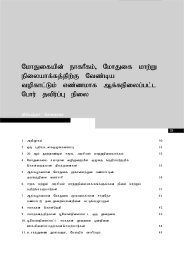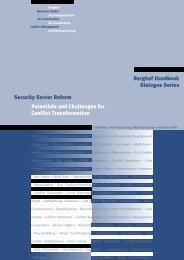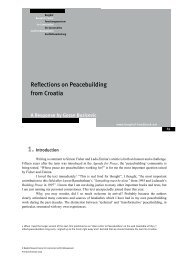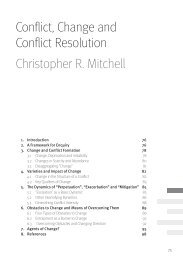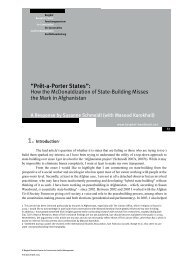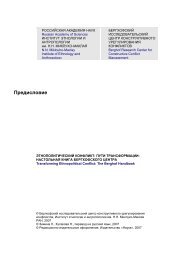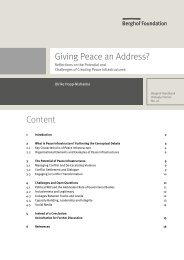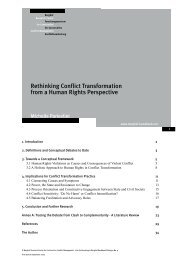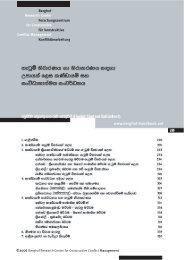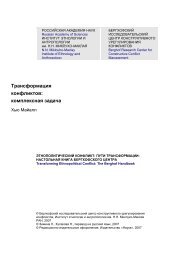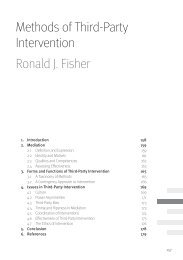Human rights and conflict transformation: The challenges of just peace
Human rights and conflict transformation: The challenges of just peace
Human rights and conflict transformation: The challenges of just peace
You also want an ePaper? Increase the reach of your titles
YUMPU automatically turns print PDFs into web optimized ePapers that Google loves.
116<br />
Bergh<strong>of</strong> H<strong>and</strong>book Dialogue No. 9<br />
Training College <strong>and</strong> the Rw<strong>and</strong>a military academy, the South Sudan <strong>Human</strong> Rights Commission,<br />
the Ethiopian <strong>Human</strong> Rights Commission as well as Ethiopian, Kenyan, Ug<strong>and</strong>an <strong>and</strong> Zimbabwean<br />
civil society. She is also a trainer in the University <strong>of</strong> Pretoria’s Good Governance courses.<br />
Dr Eileen F. Babbitt is Pr<strong>of</strong>essor <strong>of</strong> International Conflict Management Practice, director<br />
<strong>of</strong> the International Negotiation <strong>and</strong> Conflict Resolution Program <strong>and</strong> co-director <strong>of</strong> the Program<br />
on <strong>Human</strong> Rights <strong>and</strong> Conflict Resolution at the Fletcher School <strong>of</strong> Law <strong>and</strong> Diplomacy, Tufts<br />
University, USA. She is also a faculty associate <strong>of</strong> the Program on Negotiation at the Harvard Law<br />
School. Dr Babbitt’s latest publications include <strong>Human</strong> Rights <strong>and</strong> Conflict Resolution in Context:<br />
Colombia, Sierra Leone, <strong>and</strong> Northern Irel<strong>and</strong> (Syracuse University Press, 2009), co-edited with<br />
Ellen Lutz; <strong>and</strong> Negotiating Self-Determination (Lexington Books, 2007), co-edited with Hurst<br />
Hannum. She holds a master’s degree in Public Policy from the Kennedy School <strong>of</strong> Government at<br />
Harvard University, <strong>and</strong> a PhD from the Massachusetts Institute <strong>of</strong> Technology, USA.<br />
Ug<strong>and</strong>an-born Albert Gomes-Mugumya is the project coordinator for the Minority<br />
Rights <strong>and</strong> Conflict Prevention Project <strong>of</strong> the Centre for Conflict Resolution (CECORE) in Ug<strong>and</strong>a.<br />
He previously worked for the Centre for the Study <strong>of</strong> Violence <strong>and</strong> Reconciliation (CSVR) in<br />
Johannesburg, South Africa, <strong>and</strong> for Amnesty International in London, UK. He has a bachelor’s<br />
degree in Politics, History <strong>and</strong> Philosophy from Makerere University (Ug<strong>and</strong>a), <strong>and</strong> a master’s<br />
degree in Conflict Resolution from Lancaster University, UK. He is the author <strong>of</strong> United Nations<br />
Transitional Administrations – An Enigma (VDM Verlag, 2009). His areas <strong>of</strong> interest are <strong>conflict</strong><br />
<strong>transformation</strong>, <strong>peace</strong>building <strong>and</strong> human security.<br />
Dr Marwan Darweish is senior lecturer at Coventry University’s Centre for Peace<br />
<strong>and</strong> Reconciliation Studies (UK). He has wide-ranging experience as an academic, researcher <strong>and</strong><br />
lecturer, as well as in leading/facilitating training courses on <strong>conflict</strong> <strong>transformation</strong> <strong>and</strong> <strong>peace</strong><br />
processes. He has extensive experience across the Middle East region <strong>and</strong> a special interest in the<br />
Israeli/Palestinian <strong>conflict</strong> <strong>and</strong> ongoing <strong>peace</strong> negotiations. He previously worked as a <strong>peace</strong> <strong>and</strong><br />
<strong>conflict</strong> advisor at Responding to Conflict (RTC), where he took on a range <strong>of</strong> <strong>conflict</strong> consultancies<br />
including work involving the Horn, East <strong>and</strong> Central African countries.<br />
Dr Mauricio García-Durán is a Jesuit priest <strong>and</strong> researcher on <strong>peace</strong> processes <strong>and</strong><br />
social mobilisation for <strong>peace</strong> in Colombia. He is the executive director <strong>of</strong> the Center for Research<br />
<strong>and</strong> Popular Education (CINEP) in Bogotá, Colombia. He has also worked on programmes with the<br />
displaced population, for CINEP <strong>and</strong> the Jesuit Refugee Service. He has published four books <strong>and</strong><br />
more than 40 articles on violence <strong>and</strong> <strong>peace</strong>-related issues, <strong>and</strong> has a BA in Political Sciences, a BA<br />
in <strong>The</strong>ology, an MA in Philosophy, <strong>and</strong> a PhD in Peace Studies from Bradford University, UK.



